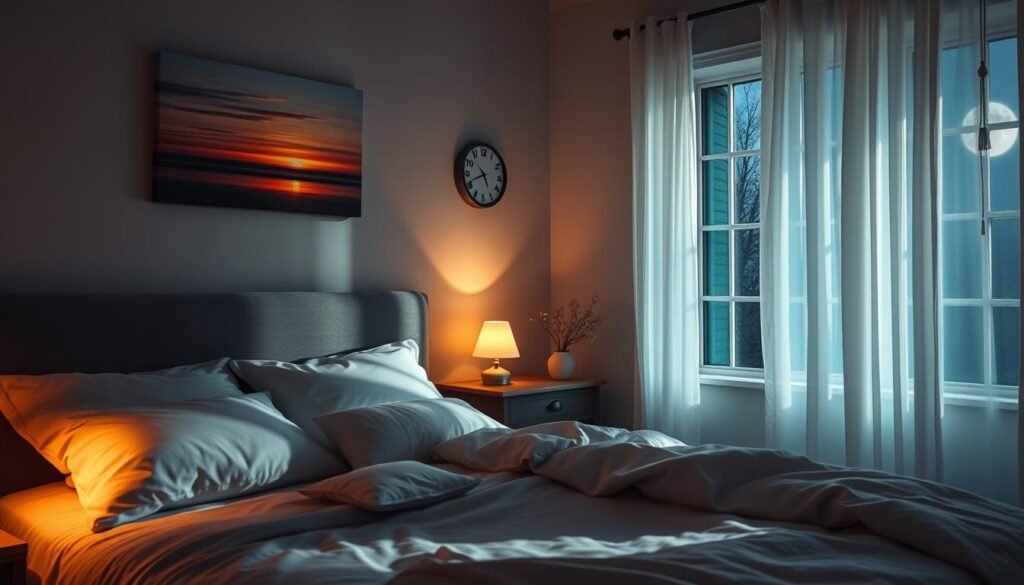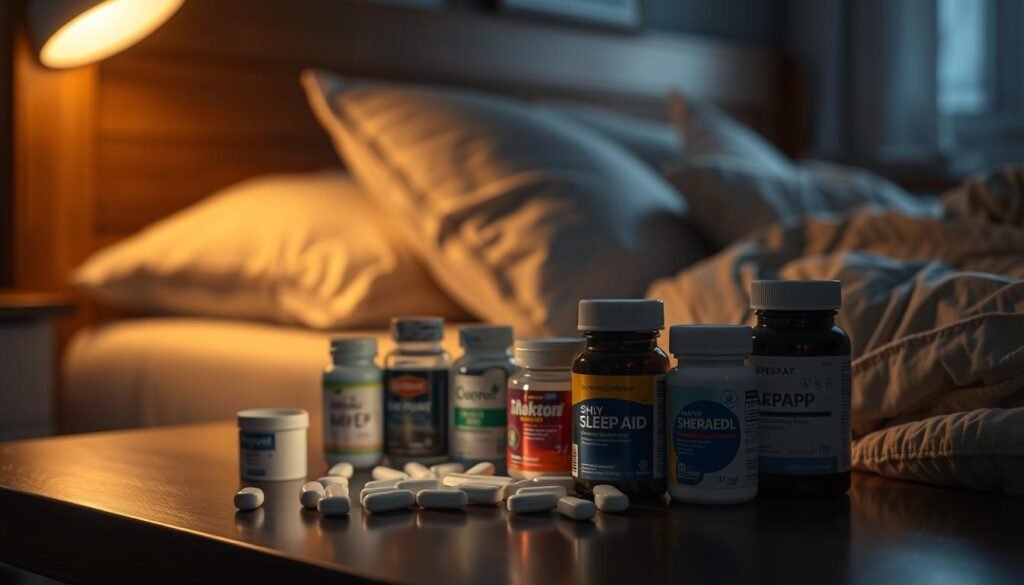Did you know around 25 million people in the U.S. are affected by insomnia each year? This results in a huge healthcare cost of about $100 billion. Addressing both mental health and insomnia together is very important. Insomnia is a symptom for many, affecting one-third of people. In some cases, up to 20 percent suffer from it as a standalone disorder. It’s key to understand how mental health and insomnia are linked to improve well-being.
Over 90 percent of people with clinical depression struggle with insomnia too. This highlights how closely related these health issues are. Insomnia can make mental health problems worse. It may even lead to conditions like Major Depressive Disorder. By seeing insomnia as both a symptom and its own condition, we can better treat sleep problems. This helps when treating other mental health issues too.
Key Takeaways
- Insomnia impacts 25 million Americans annually.
- The healthcare costs of insomnia approximate $100 billion.
- It is a significant symptom in psychiatric disorders like depression.
- Insomnia can increase the risk of developing further mental health issues.
- Understanding insomnia as a standalone condition is crucial for effective treatment.
Understanding the Connection Between Mental Health and Insomnia
It’s key to see how mental health and insomnia are linked. Studies show they often occur together. For example, about half the people with insomnia also have a mental illness. Insomnia can worsen mental health problems. This creates a cycle where bad sleep hurts mental health, and poor mental health makes sleep worse. Getting this relationship can help find the right treatments.
The Bidirectional Relationship
Insomnia and mental health disorders are closely tied. Research shows that most people with depression struggle with sleep. About 90% have trouble getting or staying asleep. For those with Generalized Anxiety Disorder (GAD), disrupted sleep is common in 5% to 10% of cases. PTSD also leads to bad sleep, affecting up to 90% of patients. Plus, insomnia can start or increase mental health issues.
This two-way street shows why we must treat mental wellness and sleep together. Improving sleep doesn’t just help you rest better. It’s also key in treating mental health problems. Working on sleep habits and therapy can help people deal with mental health challenges more effectively.
How Insomnia Affects Mental Health
Insomnia greatly influences mental health, resulting in numerous symptoms and severe outcomes. Those affected often deal with irritability and a lack of motivation. They find concentrating and remembering things harder. Studies show that lack of sleep can cause mood changes like those in anxiety and depression. For example, more than 90% of people with Major Depressive Disorder (MDD) have sleep issues.
Symptoms and Consequences
Insomnia’s effects go beyond just feeling tired. It can make mental health issues worse or cause new ones. Here are some common symptoms:
- Irritability
- Decreased motivation
- Cognitive dysfunction
- Increased susceptibility to stress
- Mood swings
The connection between insomnia and mental health is clear in statistics. These numbers show how widespread and serious insomnia is:
| Statistic | Value |
|---|---|
| Combined costs of insomnia in the U.S. | $100 billion annually |
| Increase in insomnia diagnosis (1993-2015) | 11-fold, from 800,000 to 9.4 million |
| Healthcare cost increase post-insomnia diagnosis | 80% |
| Insomnia prevalence in obstructive sleep apnea | 39% to 55% |
| Incidence of RLS symptoms in insomnia patients | 30% |
Chronic insomnia happens at least three times a week for three months or more. It’s linked to serious mental health problems. People with mental health disorders often struggle with sleep. This creates a harmful cycle, hurting mental well-being and brain function.
How Mental Health Conditions Lead to Sleep Disturbances
Mental health issues greatly affect how well we sleep. Disorders like anxiety and depression are big causes of sleep problems. If we understand how these conditions mess with sleep, we can get better at tackling insomnia. Mental health issues are tied to sleep quality. If you have these problems, you may end up sleeping poorly and feeling worse over time.
Psychological Factors
Anxiety often makes it hard to start or keep sleeping. People with a lot of anxiety can’t stop worrying, which keeps them awake. Bipolar disorder also disrupts sleep because of too much energy, especially during manic times.
Depression makes sleep complicated. People with depression might sleep too little or too much. This affects how well they sleep. Research shows that about 30% of adults have insomnia. And 40% of these people also have mental health issues. If you have trouble sleeping, you might also get depression.
Mental health issues and sleep problems feed into each other. If you don’t sleep well, your mental health can get worse. This leads to even more sleep problems. For instance, 30% to 80% of people with schizophrenia have sleep issues. Over 50 million Americans deal with chronic sleep disorders. This shows how mental health deeply affects our well-being.
| Mental Health Condition | Impact on Sleep | Prevalence of Sleep Issues |
|---|---|---|
| Anxiety | Difficulty initiating and maintaining sleep | 40-50% coexisting conditions |
| Depression | Insomnia and hypersomnia | 70% experience sleep disturbances |
| Bipolar Disorder | Episodes of hyperarousal affecting sleep | 50% report insomnia |
| Schizophrenia | Disturbed sleep patterns | 30-80% affected |
| General Insomnia | Poor sleep quality | 30% of adults |
It’s key to understand how mental health and sleep issues are connected. This knowledge helps create better ways to improve both sleep and mental health.
Common Mental Health Disorders Linked to Insomnia
Insomnia is common among those with anxiety, depression, bipolar disorder, and PTSD. Understanding this link is crucial. It helps in tackling both sleep issues and related mental health problems.
Prevalence Rates
Around 85% of people with major depressive disorder also suffer from insomnia. Insomnia can predict when depression might come back. About 27% face trouble falling asleep, staying asleep, and waking up too early.
This not only disrupts sleep but deeply affects mental and emotional well-being.
The insomnia severity index (ISI) divides insomnia into:
| Insomnia Grade | ISI Score Range |
|---|---|
| No Insomnia | 0-7 |
| Slight Insomnia | 8-14 |
| Moderate Insomnia | 15-21 |
| Severe Insomnia | 22-28 |
Elderly folks’ sleep, whether too little or too much, can lead to depression. Insomnia is not just a symptom; it worsens mental health challenges like depression and PTSD. Good sleep boosts treatment results and emotional strength.
Check out tips for healthier sleep habits for help. These tips are key in fighting insomnia and improving mental health.

Coexisting Mental Health and Insomnia: A Recap on Bidirectionality
The link between mental health issues and insomnia is complicated. It’s important to notice this connection when diagnosing and treating these problems. People with chronic insomnia often face a higher risk of developing mental health concerns like depression and anxiety. Studies show that helping someone with their insomnia can make mental health treatments work better.
Importance of Integrated Treatment
Doctors should use a treatment plan that looks at both insomnia and mental health problems. This approach doesn’t just deal with insomnia symptoms. It also looks at the mental health issues that contribute to it. For example, lasting insomnia can make depression symptoms worse, especially in those who suffer from it long-term. Starting treatments like Cognitive Behavioral Therapy (CBT) can give patients tools and ways to sleep better.
Seeing insomnia as a condition that exists on its own or with other conditions calls for a complete treatment view. Studies have found that up to 67% of people with depression also have anxiety. A good treatment plan can greatly help improve sleep and mental strength. This way, individuals could face fewer problems like heart disease and issues with metabolism.
| Condition | Comorbidity Rate | Common Treatments |
|---|---|---|
| Chronic Insomnia | High | CBT, Medication |
| Depression | 67% with anxiety | SSRIs, SNRIs |
| Anxiety Disorders | 63% with depression | Therapy, Medication |
| Schizophrenia | Frequent sleep disturbances | Integrated care, CBT |
Exploring new treatment methods, including those without medication, can greatly improve sleep and mental health. Activities like yoga and bright-light therapy are now seen as effective. They help reduce insomnia symptoms and improve mental wellbeing. In the future, focusing on the link between mental health and insomnia will be key to better health outcomes.
Role of Cognitive Behavioral Therapy in Treating Insomnia
Cognitive Behavioral Therapy for Insomnia, or CBT-I, is a major advance in treating insomnia. Studies show it helps a lot, especially for those with mental health issues. It involves 4 to 8 sessions, each lasting between 30 to 90 minutes, focusing on the patient’s needs.
Efficacy and Techniques
CBT-I uses strategies to fix the link between thoughts, feelings, and sleep. One method, cognitive restructuring, changes negative thoughts about sleep to reduce bedtime anxiety. This helps people feel less stressed about not sleeping.
Sleep Restriction Therapy (SRT) is another key part of CBT-I. It limits time in bed to improve sleep quality. However, it’s not good for everyone, like those with high-risk jobs or prone to mania or seizures.
Stimulus Control Therapy (SCT) encourages using the bed only for sleep. This stops habits like watching TV in bed. Techniques like progressive muscle relaxation and imagery training also help by easing body and mind tension.
The American Academy of Sleep Medicine supports CBT-I as a comprehensive way to fight insomnia. It not only improves sleep but also benefits mental health. For example, a study showed CBT-I with antidepressants helped with depression and insomnia symptoms in people with major depression.

Choosing CBT-I can greatly improve how insomnia is managed. It leads to better sleep and overall health.
Practicing Sleep Hygiene for Better Mental Health
Good sleep hygiene is key for better mental health. People who focus on sleep often feel better overall. Getting a regular sleep pattern and making a sleep-friendly space can really improve sleep quality. Simple steps can make a big difference, linking better sleep to better mental health.
Techniques and Recommendations
To help with good sleep hygiene, try these tips:
- Establish a consistent sleep schedule: Sleeping and waking up at the same times daily helps your body’s clock.
- Create a relaxing bedtime routine: Calm activities like reading or meditating tell your body it’s time to rest.
- Optimize the sleeping environment: A cool, quiet, and dark room helps sleep better. Blackout curtains and white noise machines can help.
- Limit screen time before bed: Cutting down on electronics helps with your natural sleep patterns.
- Avoid caffeine and heavy meals at night: These can make it hard to sleep and lead to sleep problems later.
Adding these habits to your daily routine can help your mental health. With these changes, you may find less sleep problems and more overall happiness.
Pharmacotherapy Options for Insomnia within Mental Health Contexts
Insomnia is common among those with mental health issues. A key treatment strategy is to identify and address various factors, like other illnesses. Knowing the right drugs to use is crucial for better sleep in affected individuals.
Medication Types
Different kinds of insomnia medications exist. They work in various ways and have different outcomes. Doctors often suggest:
- Benzodiazepines: These are good for short use but can cause dependency. They may also impair thinking and increase fall risk.
- Non-benzodiazepine receptor agonists (nBBRAs): Drugs like eszopiclone and zolpidem-extended release are okay for longer use. Studies show they work well over time.
- Selective serotonin reuptake inhibitors (SSRIs): These meds can help with other mental conditions causing insomnia. But, their impact on sleep varies from person to person.
Research highlights the need to tackle all factors of insomnia with behavior and drug strategies. Without treatment, nearly half the sufferers might struggle with insomnia for over three years. Chronic insomnia can worsen things, leading to around 5 million doctor visits yearly.
It’s crucial to weigh the long-term risks of these drugs. Long use of benzodiazepines may tie to higher chances of mental disorders and dementia. It’s important to keep checking on the patient’s progress and adjust the treatment as needed.
To wrap up, treating insomnia with drugs like benzodiazepines, nBBRAs, and SSRIs, requires thorough review of the patient’s history and the drugs’ ongoing impact. For more info on treatment options, check out this detailed guide on pharmacotherapy for insomnia.

| Medication Type | Duration of Use | Pseudonym for Effectiveness | Risks |
|---|---|---|---|
| Benzodiazepines | Short-term (up to 4 weeks) | Effective for anxiety-induced insomnia | Dependency, cognitive impairment |
| nBBRAs | Long-term (12 months approved) | Stable sleep patterns | Potential for next-day impairment |
| SSRIs | Varied (depending on underlying condition) | Improvement in mood | Variable impact on sleep quality |
Stress Management Techniques to Combat Insomnia
Understanding how stress management and insomnia are linked can lead to improved sleep and mental well-being. Mindfulness plays a big role in lowering stress, which can help with insomnia symptoms. Adding mindfulness to daily life can boost sleep quality.
Mindfulness Practices
For those fighting insomnia, mindfulness can be a key solution. Practices such as meditation, yoga, and deep breathing not only reduce stress but also improve sleep. Studies show mindfulness meditation changes the body in a way that helps manage stress better. People who meditate regularly can focus better, which helps with sleep.
- Meditation: A practice that fosters relaxation and a peaceful mind.
- Yoga: Combines poses with breathing for mental and physical wellness.
- Deep Breathing: Simple techniques that reduce stress, promoting calmness.
Regular mindfulness practices can greatly help with stress management, leading to better sleep and mental health. Research backs the importance of managing stress for dealing with insomnia. To learn more, checking out stress management techniques can offer insights into improving sleep quality.
Conclusion
It’s key to know how mental health and insomnia are linked to better our wellness. The deep connection between them can greatly affect healing. Insomnia does more than ruin a good night’s sleep. It impacts different mental health issues too. This creates a cycle that’s hard to break free from.
When sleep disorders and mental illness mix, it shows why we must see how complex this tie is. By looking at mental health and insomnia together, we can find better ways to help. This might mean combining different treatments. Things like therapy, medication, and changing daily habits could improve sleep habits. If you’re struggling with sleep or mental health, getting professional advice is important. This ensures all aspects of your well-being are cared for.
With 20-30% of people facing insomnia and its tie to mental health issues, action is needed. Understanding how sleep and mental health affect each other can make treatments work better. It leads to a healthier and more balanced life for all.